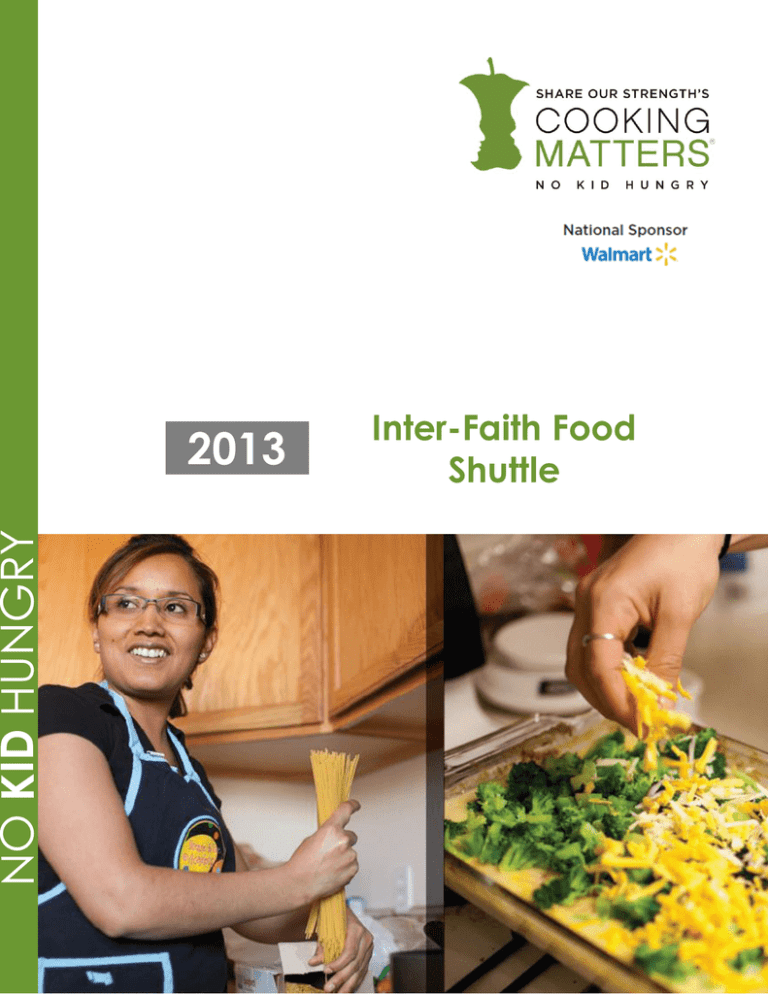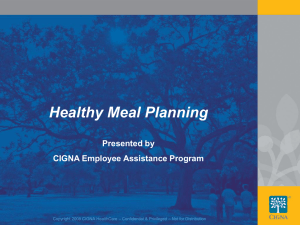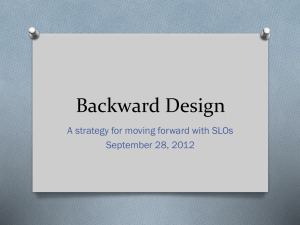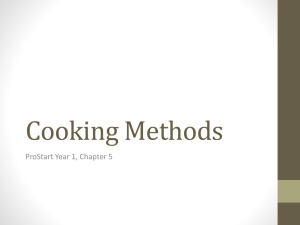
NO KID HUNGRY
2013
Inter-Faith Food
Shuttle
38
90
COURSES
TOURS
414
588
COURSE
PARTICIPANTS
TOUR
PARTICIPANTS
84%
157
GRADUATION
RATE
TOTAL
VOLUNTEERS
Inter-Faith Food Shuttle
Serving the State of North Carolina
Main Contact: Jill Brown · 919.390.1959 · Jill.Brown@foodshuttle.org
Mission: The Inter-Faith Food Shuttle pioneers innovative, transformative solutions designed to
end hunger in our community.
As part of the No Kid Hungry campaign working to end childhood hunger in America, Share
Our Strength’s Cooking Matters® empowers low-income families to stretch their food budgets
so their children get healthy meals at home. Participants learn to shop smarter, use nutrition
information to make healthier choices, and cook delicious, affordable meals. Cooking Matters
courses and tours equip families with the skills they need to stretch their food dollars and
maximize the benefits they receive through public nutrition programs like SNAP (food stamps)
and WIC (Women, Infants and Children). For more information, visit CookingMatters.org.
Share Our Strength’s Cooking Matters Lead Partner Report | 2013
2
2
Inter-Faith Food Shuttle reached
239% more
families in 2013 compared to 2009, helping more
families improve the way they shop, cook, and eat.
Cooking Matters Growth
1200
1000
800
600
Tour Participants
Course Participants
400
200
0
2009
2010
2011
2012
2013
Share Our Strength’s Cooking Matters Lead Partner Report | 2013
3
3
2013 Inter-Faith Food Shuttle Participant
Demographics
Participation in Nutrition Assistance Programs
42% of participants receive at least one form of federal food assistance1
32%
16%
Free or
Reduced-Price
School Breakfast2
SNAP (Food
Stamps)
2%
16%
Free or
Reduced-Price
School Lunch2
WIC3
Average
Household
Size: 2.9
Food Pantry
Average
Number of
Children: 1.0
Free or
Reduced-Price
School Supper2
16%
14%
Free Summer
Meals
1%
3%
Head Start3
Adults with
Children
Under 18 in
The home: 43%
Adults with
Children
Under 6 in
The home: 24%
Participant Race/Ethnicity
White
29%
Asian
1%
African
American
61%
Pacific
Islander
0%
Latino
16%
Native
American
2%
Other
10%
1. Federal food assistance includes SNAP; WIC; free or reduced-price school breakfast, lunch, or supper; and free summer
meals.
2. Based only on adult participants with children aged 6-17 in the home.
3. Based only adult participants who are pregnant or adult participants with children under age 6 in the home.
*Respondents could select more than one response to each question, so percentages will not sum to 100%.
Share Our Strength’s Cooking Matters Lead Partner Report | 2013
4
4
2013 Inter-Faith Food Shuttle Participant
Demographics by Age Group
Adult Participants
Sex
Male
Female
%
Male
40%
78%
Female
60%
Age
Under 18
30-39
40-49
%
22%
Age
18-29
Teen Participants
Sex
Under 13
44%
11%
13-15
52%
14%
16-17
0%
1%
20%
18-20
4%
50-59
23%
Over 20
0%
60 and over
31%
Race/Ethnicity
Race/Ethnicity
White
31%
White
11%
African American
60%
African American
79%
Latino
Asian
13%
10%
1%
Latino
Asian
Pacific Islander
0%
Pacific Islander
0%
Native American
1%
Native American
0%
8%
Other
Other
Education
0%
14%
Education
Less than a high school degree
20%
7th grade or less
71%
High school degree or GED
35%
8th grade
14%
Some college, but have not graduated
17%
9th grade
7%
Two-year college degree
12%
10th grade
4%
Four-year college degree
17%
11th grade
0%
Participation in Nutrition Assistance
12th grade or GED
4%
WIC
14%
Attended college
0%
SNAP (formerly Food Stamps)
35%
Participation in Nutrition Assistance
Free/Reduced-Price School Breakfast
13%
WIC
Free/Reduced-Price School Lunch
13%
SNAP (formerly Food Stamps)
11%
Free/Reduced-Price School Supper
1%
Free/Reduced-Price School Breakfast
15%
Free Summer Meals
1%
Free/Reduced-Price School Lunch
19%
3%
Free/Reduced-Price School Supper
0%
Head Start
4%
Food Pantry or Commodities
18%
Free Summer Meals
0%
None of these programs
46%
Head Start
4%
Food Pantry or Commodities
None of these programs
Share Our Strength’s Cooking Matters Lead Partner Report | 2013
4%
78%
5
5
2013 Inter-Faith Food Shuttle Participant
Demographics by Age Group
Child Participants
Sex
%
Male
50%
Female
50%
Age
7 and under
19%
8
17%
9
18%
10
25%
11
6%
12
3%
13 and over
11%
Race/Ethnicity
White
23%
African American
60%
Latino
Asian
31%
2%
Pacific Islander
1%
Native American
5%
Other
23%
Participation in Nutrition Assistance
WIC
11%
SNAP (formerly Food Stamps)
20%
Free/Reduced-Price School Breakfast
36%
Free/Reduced-Price School Lunch
38%
Free/Reduced-Price School Supper
2%
Free Summer Meals
9%
Head Start
2%
Food Pantry or Commodities
5%
None of these programs
51%
Share Our Strength’s Cooking Matters Lead Partner Report | 2013
6
6
2013 Inter-Faith Food Shuttle Participants by
Curriculum
Cooking Matters for Teens, 36
Cooking Matters for Families, 49
Cooking Matters for Kids,
139
Cooking Matters for AdultsSpanish, 25
Cooking Matters for Adults, 165
Cooking Matters at the Store for
Adults, 557
Cooking Matters at the
Store for WIC Parents, 31
Share Our Strength’s Cooking Matters Lead Partner Report | 2013
7
7
Snapshot of Graduate Changes
After a course, adult and teen graduates report that:
64% are eating more vegetables
70% are eating more fruits
52% are eating more whole grains
83% improved their cooking skills
97% would share things learned in this course with others
*Results based on 145 graduate surveys (graduate response rate of 81%)
After a course, adult and teen graduates are:
Cooking meals instead of buying take-out 8% more often
Using the “Nutrition Facts” label 85% more often
Eating at least 2 cups of fruit a day 39% more often
Eating at least 2.5 cups of vegetables a day 26% more often
Making meals with at least 3 food groups 34% more often
*Results based on 145 graduate surveys (graduate response rate of 81%)
After a course, adult graduates are:
Planning meals ahead of time 37% more often
Comparing prices before buying food 27% more often
Shopping with a grocery list 30% more often
Thinking about healthy food choices 46% more often
*Results based on 122 graduate surveys (graduate response rate of 79%)
After a course, child course graduates:
54% are more confident that they can make snacks with fruit or vegetables
45% are more confident that they can talk to their parents about healthy
cooking or eating
42% are more confident that they can make healthy choices at the grocery
store or when out to eat
*Results based on 114 graduate surveys (graduate response rate of 88%)
After a tour, graduates report that:
80% intend to try comparing unit prices, reading ingredient lists to identify
whole grains, or comparing food labels
*Results based on 449 graduate surveys (graduate response rate of 76%)
Share Our Strength’s Cooking Matters Lead Partner Report | 2013
8
8
Courses
About Cooking Matters Courses
Community partners that serve low-income families offer six-week
Cooking Matters courses to adults, kids and families. Each course is
team-taught by a volunteer chef and nutrition educator and
covers meal preparation, grocery shopping, food budgeting and
nutrition. Adult and teen participants take home a bag of
groceries at the end of each class.
Share Our Strength’s Cooking Matters Lead Partner Report | 2013
9
9
Measuring Course Impact
Example
+ 98%
CHANGE
6,957
98%
About Our Outcomes
The tables throughout this report document
changes in behavior, confidence, and attitudes
experienced by graduates of Cooking Matters
courses, as measured through surveys completed
by graduates. Tables report the before-course and
after-course average for each question, along
with the percent change between the two.
Share Our Strength’s Cooking Matters Lead Partner Report | 2013
10
10
Cooking Matters for Adults Results
Cooking Matters for Adults teaches low-income adults how to prepare and
shop sensibly for healthy meals on a limited budget.
18
190
COURSES
PARTICIPANTS
77%
GRADUATION
RATE
By the end of the 6-week course, graduates reported** that:
65% are eating more vegetables (71%*)
69% are eating more fruits (67%*)
32% are eating more low-fat or fat-free milk products
(45%*)
51% are eating more whole grains (68%*)
59% are eating more lean meat, chicken, or fish
(52%*)
69% are drinking more water (63%*)
39% made a Cooking Matters recipe at home
(84%*)
84% improved their cooking skills (89%*)
98% would share things learned in this course with
others (98%*)
*National average
** Results based on 99 graduate surveys (graduate response rate of 78%)
“I have learned
“Cooking
Matters
for Adults
how
to eat
teaches
more
low-incomeand
healthfully
adults
how
tohow
readtothe
prepare
labels
more
and shop
sensibly for
carefully.”
healthy meals on
– Cooking Matters for
a
limited
budget”
Adults
graduate,
Greensboro, NC
– Cooking Matters for
Adults graduate, City,
State
Share Our Strength’s Cooking Matters Lead Partner Report | 2013
11
11
Cooking Matters for Adults Results
Cooking Matters for Adults teaches low-income adults how to prepare and
shop sensibly for healthy meals on a limited budget.
Before (LP) After (LP)
Percent
Change
Before
(National)
After
(National)
Percent
Change
Food Budgeting (How often do you…)
Plan meals ahead of time
1.73
2.47
43%
1.86
2.86
54%
Compare prices before buying food
2.23
2.90
30%
2.39
3.29
38%
Run out of food before getting money to buy
more
1.30
1.10
-15%
1.37
1.10
-20%
Shop with a grocery list
1.79
2.41
35%
2.06
2.94
43%
Cook meals instead of buying take-out or
already prepared foods
2.53
2.73
8%
2.64
3.00
13%
Think about healthy food choices when
deciding what to feed your family
1.86
2.88
55%
2.23
3.27
46%
Add salt when preparing food
1.86
1.63
-13%
2.09
1.53
-27%
Use the “Nutrition Facts” label to make food
choices
1.55
2.64
71%
1.49
2.94
98%
Eat within 2 hours of waking up
1.94
2.52
30%
2.38
2.97
25%
Eat at least 2 cups of fruit each day
1.69
2.36
39%
1.81
2.69
49%
Eat at least 2.5 cups of vegetables each day
2.15
2.74
28%
1.94
2.80
44%
Make meals that include at least 3 food groups
2.18
2.97
36%
2.13
3.10
45%
Get at least 30 minutes of physical activity
each day
2.05
2.54
24%
2.13
2.79
31%
Thaw frozen foods at room temperature
1.63
1.52
-7%
1.71
1.11
-35%
Leave meat and dairy foods out more than 2
hours
0.71
0.62
-13%
0.81
0.44
-46%
Nutrition Habits (How often do you…)
Food Safety (How often do you…)
*Results based on 99 graduate surveys (graduate response rate of 78%)
4=Almost always; 3=Most of the time; 2=Sometimes; 1=Seldom; 0=Never
Share Our Strength’s Cooking Matters Lead Partner Report | 2013
12
12
Cooking Matters for Adults Results
Revised Survey
A revised survey was used for Cooking Matters for Adults courses beginning in
fall 2013.
Before
(LP)
After (LP)
Percent
Change
Before
After
(National) (National)
Percent
Change
2.64
2.54
2.78
2.46
2.61
3.04
-7%
3%
9%
2.35
2.33
2.62
2.69
2.69
2.94
15%
16%
12%
2.04
2.39
18%
2.12
2.50
18%
2.64
2.75
4%
2.71
3.03
12%
2.11
2.61
24%
2.20
2.53
15%
1.19
0.79
0.86
1.11
0.75
0.86
-6%
-5%
0%
1.51
1.22
1.27
1.19
0.99
1.02
-21%
-19%
-19%
Food Choices (How often do you choose…)
Low-fat milk (skim or 1%) when you have milk
Low-fat or fat-free options when you eat dairy
Whole grain products when you eat grains
Low-sodium options when you buy easy-to-prepare,
packaged foods
Lean meat or low-fat proteins when you buy meat or
protein foods
Healthy foods when you eat at fast-food or sit-down
restaurants
Cooking Attitudes
Cooking takes too much time.
Cooking is frustrating.
It is too much work to cook.
*Results based on 32 graduate surveys (number of graduate surveys exceeds number of graduates reported)
Behavior: 4=Always; 3=Often; 2=Sometimes; 1=Rarely; 0=Never
4=Completely Confident; 3=Very Confident; 2=Somewhat Confident; 1=A Little Confident; 0=Not at all Confident
Share Our Strength’s Cooking Matters Lead Partner Report | 2013
13
13
Cooking Matters for Adults Results
Revised Survey
A revised survey was used for Cooking Matters for Adults courses beginning in
fall 2013.
Before
(LP)
After (LP)
Percent
Change
Before
After
(National) (National)
Percent
Change
3.00
2.14
2.31
3.03
2.38
2.59
1%
11%
12%
2.97
2.44
2.53
3.20
2.71
2.85
8%
11%
13%
2.07
2.52
22%
2.11
2.03
-4%
2.07
2.48
2.69
2.82
2.76
2.83
36%
11%
5%
2.15
2.44
2.56
2.73
2.74
2.93
27%
12%
15%
2.90
2.93
1%
2.64
2.90
10%
2.97
2.62
-12%
2.56
2.85
11%
2.72
2.72
0%
2.54
2.92
15%
3.14
3.38
8%
3.00
3.39
13%
3.31
3.28
-1%
2.90
3.38
16%
2.97
3.00
3.28
3.41
3.45
3.31
3.34
3.59
16%
10%
2%
5%
3.19
2.89
2.93
3.12
3.56
3.40
3.45
3.54
12%
18%
18%
14%
Behaviors (How often do you…)
Compare prices before you buy food
Plan meals ahead of time
Use a grocery list when you go grocery shopping
Worry that your food might run out before you get
money to buy more
Use the “nutrition facts” on food labels
Eat something within two hours of waking up
Eat food from each food group every day
Make homemade meals “from scratch” using mainly
basic whole ingredients
Adjust meals to include specific ingredients that are
more “budget friendly"
Adjust meals to be more healthy
Confidence (How confident are you that you can…)
Use the same healthy ingredient in more than one
meal
Choose the best-priced form of fruits and vegetables
(fresh, frozen, or canned)
Use basic cooking skills
Buy healthy foods for your family on a budget
Cook healthy foods for your family on a budget
Help your family eat more healthy
*Results based on 32 graduate surveys (number of graduate surveys exceeds number of graduates reported)
Behavior: 4=Always; 3=Often; 2=Sometimes; 1=Rarely; 0=Never
4=Completely Confident; 3=Very Confident; 2=Somewhat Confident; 1=A Little Confident; 0=Not at all Confident
Share Our Strength’s Cooking Matters Lead Partner Report | 2013
14
14
Cooking Matters for Kids Results
Cooking Matters for Kids teaches children in 3rd through 5th grade how to
prepare healthy meals and snacks and to make smart choices wherever they
go – at school, at home, at the store, or out to eat.
12
139
COURSES
PARTICIPANTS
94%
GRADUATION
RATE
“My favorite part
was reading the
ingredients.”
– Cooking Matters for Kids
graduate, Apex, NC
Share Our Strength’s Cooking Matters Lead Partner Report | 2013
15
15
Cooking Matters for Kids Results
Cooking Matters for Kids teaches children in 3rd through 5th grade how to
prepare healthy meals and snacks and to make smart choices wherever they
go – at school, at home, at the store, or out to eat.
Before (LP) After (LP)
Percent
Change
Before
After
(National) (National)
Percent
Change
Confidence (I can…)
Make something to eat with fruit all by myself
3.14
3.59
13%
3.32
3.67
11%
2.78
3.29
16%
2.96
3.34
13%
3.04
3.18
4%
3.20
3.37
5%
Make healthy choices at the grocery store
3.25
3.55
9%
3.33
3.51
6%
Talk to my family about healthy eating
2.89
3.40
15%
3.25
3.44
6%
Talk to my family about healthy cooking
3.18
3.52
10%
3.28
3.48
6%
Follow recipe directions
3.30
3.70
11%
3.40
3.66
7%
Use a knife safely
3.57
3.76
5%
3.40
3.70
9%
Trying new foods
3.30
3.35
1%
3.30
3.43
4%
Eating fruit
3.89
3.92
1%
3.82
3.86
1%
Eating vegetables
3.20
3.30
3%
3.02
3.14
4%
Eating whole grains
3.04
3.47
13%
3.26
3.41
5%
Choosing drinks low in sugar
3.08
3.30
7%
3.08
3.21
4%
Make something to eat with vegetables all by
myself
Make healthy choices when I'm out to eat
Attitudes (How do you feel about…)
*Results based on 114 graduate surveys (graduate response rate of 88%)
Confidence: 4=YES!; 3=Yes; 2=Not sure; 1=No; 0=NO!
Attitudes: 4=I really like…; 3=I like…; 2=I’m not sure…; 1=I don’t like…; 0=I really don’t like…
Share Our Strength’s Cooking Matters Lead Partner Report | 2013
16
16
Cooking Matters for Families- Adult Results
Cooking Matters for Families brings school-aged children and their families
together to learn about healthy eating, planning meals as a family, and
working together in the kitchen.
4
49
COURSES
PARTICIPANTS
96%
GRADUATION
RATE
By the end of the 6-week course, adult graduates reported**
that:
46% are eating more vegetables (74%*)
69% are eating more fruits (62%*)
23% are eating more low-fat or fat-free milk products
(44%*)
54% are eating more whole grains (66%*)
46% are eating more lean meat, chicken, or fish
(51%*)
54% are drinking more water (59%*)
43% made a Cooking Matters recipe at home
(91%*)
“It has helped our
daughter to feel
more confident
helping in the
kitchen and has
helped me to be
more creative in
cooking meals.”
71% improved their cooking skills (85%*)
93% would share things learned in this course with
others (99%*)
– Cooking Matters for
Families graduate,
Clayton, NC
*National average
** Results based on 15 graduate surveys (graduate response rate of 54%)
Share Our Strength’s Cooking Matters Lead Partner Report | 2013
17
17
Cooking Matters for Families- Adult Results
Cooking Matters for Families brings school-aged children and their families
together to learn about healthy eating, planning meals as a family, and
working together in the kitchen.
Before (LP) After (LP)
Percent
Change
Before
(National)
After
(National)
Percent
Change
Food Budgeting (How often do you…)
Plan meals ahead of time
2.75
3.00
9%
1.98
2.76
40%
Compare prices before buying food
Run out of food before getting money to buy
more
2.75
3.00
9%
2.68
3.28
22%
1.38
1.38
0%
1.39
1.18
-15%
Shop with a grocery list
3.13
3.50
12%
2.13
2.85
34%
Cook meals instead of buying take-out or
already prepared foods
3.13
3.13
0%
2.84
3.17
12%
3.11
3.33
7%
2.35
3.35
42%
2.44
2.11
-14%
2.21
1.71
-23%
1.56
2.89
86%
1.59
2.94
86%
Eat at least 2 cups of fruit each day
1.89
2.67
41%
1.88
2.70
44%
Eat at least 2.5 cups of vegetables each day
2.13
2.63
24%
2.00
2.80
40%
Make meals that include at least 3 food groups
2.50
3.13
25%
2.39
3.19
33%
Thaw frozen foods at room temperature
0.88
0.63
-29%
1.75
1.13
-36%
Leave meat and dairy foods out more than 2
hours
0.13
0.00
-100%
0.71
0.35
-51%
Nutrition Habits (How often do you…)
Think about healthy food choices when
deciding what to feed your family
Add salt when preparing food
Use the “Nutrition Facts” label to make food
choices
Food Safety (How often do you…)
Family Food Behavior (How often do you…)
Plan meals together as a family
2.00
2.63
31%
1.39
2.38
71%
Prepare meals together as a family
1.78
2.56
44%
1.37
2.40
75%
Eat meals together as a family
2.71
3.29
21%
2.76
3.25
18%
*Results based on 15 graduate surveys (graduate response rate of 54%)
4=Almost always; 3=Most of the time; 2=Sometimes; 1=Seldom; 0=Never
Share Our Strength’s Cooking Matters Lead Partner Report | 2013
18
18
Cooking Matters for Families Results
Cooking Matters for Families: Adult Results (Continued)
This idea I am thinking I plan on
is not for about trying trying this
me.
this.
soon.
I tried
this
I already did
during this before
the 6taking the
week
course.
course.
Total % trying % trying or
or likely to try likely to try
as a result of (National
the course** Average)**
What do you think about these ideas?
Let kids help decide which
foods are served
6%
19%
6%
38%
31%
63%
69%
Let kids help prepare meals
6%
6%
19%
25%
44%
50%
68%
Let kids see you enjoy the same
healthy foods they are eating
0%
0%
14%
21%
64%
36%
50%
Let kids serve themselves
0%
7%
20%
33%
40%
60%
52%
Eat with kids at the table
0%
0%
13%
7%
80%
20%
31%
Encourage conversation at
meal time
0%
7%
7%
7%
80%
20%
33%
Results based on 15 graduate surveys (graduate response rate of 54%)
*National average
***Sum of I am thinking about trying this, I plan on trying this soon, and I tried this during the 6-week course.
Cooking Matters for Families: Child Results
By the end of the course, child graduates reported** that:
93% liked coming to class each week (99%*)
100% learned at least one new thing about eating healthy (97%*)
100% liked cooking with their parents in class (97%*)
87% like helping plan family meals (92%*)
94% like eating meals with their family at home (97%*)
44% made a Cooking Matters recipe at home with their parents (87%*)
81% improved their cooking skills (90%*)
** Results based on 16 graduate surveys (graduate response rate of 84%)
Share Our Strength’s Cooking Matters Lead Partner Report | 2013
19
19
Cooking Matters for Teens Results
Cooking Matters for Teens teaches adolescents in 6th grade and up how to
make healthy food choices and prepare healthy meals and snacks.
4
36
COURSES
PARTICIPANTS
67%
GRADUATION
RATE
By the end of the 6-week course, graduates reported** that:
73% are eating more vegetables (49%*)
73% are eating more fruits (65%*)
50% are eating more low-fat or fat-free milk products
(28%*)
55% are eating more whole grains (46%*)
64% are eating more lean meat, chicken, or fish
(39%*)
91% are drinking more water (68%*)
74% made a Cooking Matters recipe at home
(50%*)
86% improved their cooking skills (81%*)
“It has helped me
understand food
better & eat more
food that is
healthy.”
– Cooking Matters for
Teens graduate, Durham,
NC
95% would share things learned in this course with
others (92%*)
*National average
** Results based on 23 graduate surveys (graduate response rate of 96%)
Share Our Strength’s Cooking Matters Lead Partner Report | 2013
20
20
Cooking Matters for Teens Results
Cooking Matters for Teens teaches adolescents in 6th grade and up how to
make healthy food choices and prepare healthy meals and snacks.
Before (LP) After (LP)
Percent
Change
Before
After
(National) (National)
Percent
Change
Food Budgeting (How often do you…)
Make meals or snacks at home instead of buying
take-out or already prepared foods
2.43
2.71
12%
2.23
2.70
21%
Make meals that include at least 3 food groups
2.10
2.76
32%
1.96
2.65
36%
Eat at least 2 cups of fruit each day
1.90
2.62
38%
1.98
2.52
27%
Eat at least 2.5 cups of vegetables each day
1.82
2.23
23%
1.63
2.19
34%
Eat within 2 hours of waking up
2.43
2.29
-6%
2.32
2.69
16%
Get at least 30 minutes of physical activity each
day
3.05
3.24
6%
2.67
3.01
13%
Choose healthy foods for snacks
1.59
2.68
69%
1.80
2.45
36%
Use the “Nutrition Facts” label to make food
choices
1.10
2.71
148%
1.14
2.08
83%
Nutrition Habits (How often do you…)
*Results based on 23 graduate surveys (graduate response rate of 96%)
4=Almost Always; 3=Most of the time; 2=Sometimes; 1=Seldom; 0=Never
Share Our Strength’s Cooking Matters Lead Partner Report | 2013
21
21
Tours
About Cooking Matters at the Store Tours
Cooking Matters at the Store tours provide families with hands-on
education as they shop for food, giving them skills to compare
foods for cost and nutrition. Participants learn how to plan and
budget for healthy, affordable, and delicious meals for their
families, all for under $10.
Share Our Strength’s Cooking Matters Lead Partner Report | 2013
22
22
Cooking Matters at the Store for Adults Results
Cooking Matters at the Store is an interactive grocery store tour that helps
low-income families get the most nutrition from their food dollars.
85
557
TOURS
GRADUATES
99% of graduates liked or really liked the tour
This idea I am thinking I plan on
is not for about trying trying this
me.
this.
soon.
(98%*)
I already Total % likely
% likely to try
did this
to try as a
(National
before
result of the
Average)**
the tour.
tour**
What do you think about these ideas?
Compare unit prices to find
the best deal
5%
13%
55%
27%
68%
63%
Read ingredient lists to find
whole grains
4%
11%
57%
28%
68%
67%
Compare food labels to make
healthy choices
3%
11%
54%
32%
65%
63%
Results based on 529 graduate surveys (graduate response rate of 95%)
*National average
***Sum of I am thinking about trying this and I plan on trying this soon.
Share Our Strength’s Cooking Matters Lead Partner Report | 2013
23
23
Cooking Matters at the Store for WIC Parents Results
Cooking Matters at the Store is an interactive grocery store tour that helps
low-income families get the most nutrition from their food dollars. The WIC
parents tour focuses on teaching parents to maximize the healthy food they
can obtain using their WIC benefits.
5
31
TOURS
GRADUATES
100% of graduates liked or really liked the tour
This idea I am thinking I plan on
is not for about trying trying this
me.
this.
soon.
(99%*)
I already Total % likely
% likely to try
did this
to try as a
(National
before
result of the
Average)**
the tour.
tour**
What do you think about these ideas?
Compare unit prices to find
the best deal
14%
29%
43%
14%
72%
68%
Read ingredient lists to find
whole grains
13%
13%
50%
25%
63%
70%
Compare food labels to make
healthy choices
14%
14%
57%
14%
71%
65%
Results based on 8 graduate surveys (graduate response rate of 26%)
*National average
***Sum of I am thinking about trying this and I plan on trying this soon.
Not at all
confident
A little
confident
Somewhat
Very
confident confident
0%
0%
0%
0%
0%
0%
Completely
confident
Not sure
N
57%
43%
0%
7
57%
43%
0%
7
How confident are you that you can...?
Make the most of your WIC
fruit and vegetable vouchers
Identify WIC foods at the
grocery store
Results based on 8 graduate surveys (graduate response rate of 26%)
Share Our Strength’s Cooking Matters Lead Partner Report | 2013
24
24
Host Agencies
Inter-Faith Food Shuttle works with community-based groups that
provide the venue and on-site coordination for Cooking Matters
courses and tours. These host agencies are often schools, housing
programs, Head Start centers, WIC clinics, churches, or
community centers.
In 2013, Inter-Faith Food Shuttle partnered with the following organizations in the
community:
Raleigh Boys Club
Martin Street Baptist Church
Apex UMC
Harnett County Cooperative Extension
Inter-Faith Food Shuttle
Iglesia El Buen Pastor
Saint Bernadette Catholic Church
Durham Diabetes Coalition
Durham Housing Authority
Hoke Street
YFTP
EFNEP
Durham Nativity School
Alliance Medical Ministry
Communities in Schools
East Coast Migrant Head Start Project
Community Workforce Solutions
Urban Ministries
NCSU
WCHS WIC
UNC HPDP
CNP
Second Harvest Food Bank of
Northwest North Carolina
CIS Randolph County
Richmond County Cooperative
Extension
FirstHealth
Wake County Human Services
West Durham Baptist Church
Benson Area Medical Clinic
Share Our Strength’s Cooking Matters Lead Partner Report | 2013
25
25
Inter-Faith Food Shuttle Volunteers
Volunteers are the heart of Cooking Matters. Chefs, nutrition educators, and
community leaders volunteer at least 12 hours over six weeks to teach courses and
spend additional time leading tours, where they share their expertise with families in
need and empower them to get more from their food resources. Volunteers also
serve in course support roles and as members of local advisory councils.
In 2013, 157 people volunteered for courses, tours, or in
other capacities.
2013 Cooking Matters Volunteers >>
Christy O'Connor
Margaret Schneider
Amanda Weber
Lydia Loyd
Dana Nelson
Guney Acipayamli
Rhonda Church
Hannah Hess
Lynette Driver
Trudie Brinson
Megan Dixon
Meredith Whiteley
Mary Taylor Gaskins
Rose Ponton
Jill Recker
Kathryn Kolasa
Jackie Sugg
Hannah Libera
Kimberley Kruse
Rachelle Chiang
Alain Wellerstein
Yancey Crawford
Margaret Frey
Cara Jenkins
Jessica Sisneros
jalen cooper
Katie Williams
Diana Vetter Craft
Kelli Davidson
Vandita Sinha
Allison Swart
joelle friend
Maria Ratliff
Robin High
Mina Ghadimi Nouran
Caroline Cohen
Lauren Porter
Natalie Taft
Graham Brown
Tarry Payton
Lynn Antil
Rebecca Faris
Nicole Connell
Allison Clonch
Tina Irrer
Christine Davis
Kevin Wilson
Betsy Petruccelli
William Chapman
Lindsey Winfree
Schuyler Edmondson
Melissa Guido
Morgan Medders
Andrew (Drew) Carelle
Natasha Brown
Donna Reaves
Hartley Collins
Lauren Rakes
Leah Tedrick-Moutz
N'gai Dickerson
Share Our Strength’s Cooking Matters Lead Partner Report | 2013
26
26
2013 Cooking Matters Volunteers >>
(Continued)
Gin Reid Hall
Meredith Ebersohl
Kayla Lawson
Charlotte Stone
Samantha Tinsley
Rebecca Houser
Beth Kizhnerman
Lesley Rollins
Preslyn Phillips
Jim Waynick
Megan Dixon
Angel Huerta-Pilgrim
Emily Auerbach
Eugenia Molina
Elizabeth Parham
Alex Biggers
Avi Aggarwal
Lindsay Turner
Mara Pickard
Erin Lebow-Skelley
Alex Antolino
Karen Burke
Meg Mangan Pepper
Kate Southard
Molly Jones
Lourdes Renee Vinueza
Jordan Todd
Jennifer Leeman
Hannah Pettus
Cicely Kaikai
Kamaria Mason
Emily Welker
Kerry Jones
Wendy Rosenstock
Beth Hopping
Rosana Echeverria
Sharon Mahotski
Linden Thayer
Nick Slagel
Maria Garrido
Victoria Long
Kathryn Leach
Caroline Dickson
Janesse Hill
Emily Bissett
Annie Lassiter
Katie Carr
Jennifer Mlor
Chastity Majoni
Jessica Iselin
Alexis Moody
Daniella Uslan
Jes Brewer
James Hampson
Vincent Feucht
Annie Rose Wilt
Ana Martinez
Becky Dobosy
Halle Mangrum
Aila Goforth
Elizabeth Perez-Huerta
Meredith Erin Martin
Ashley Meyer
Melinda Bowman
Sean Kramer
Lisa Briggs
Sarah Lowe
Daniel Buchenberger
Huong Do
Liz Leslie
Molly Hass
Addie Brannin
Bonita Chen
Amber Leigh McKee
Veronica Torres
Sarah Snow
Erin Ravine
Nora Weston
Melody Braswell
Allison Jennings
Maxine Goldston
Kristin Clark
Theresa Lamothe
Robin Ackland
Karen Gill
Avery Andrews
Amanda Hinshaw
Patience Ergish
Grace Ann Carroll
Rosemary Dietrick
Share Our Strength’s Cooking Matters Lead Partner Report | 2013
27
27
2013 Cooking Matters Volunteers >>
(Continued)
Sarah Burch
Pat Butler
Katrina Levine
Jessica Krysty
Kevin Underwood
Sara Stohler
Share Our Strength’s Cooking Matters Lead Partner Report | 2013
28
28







